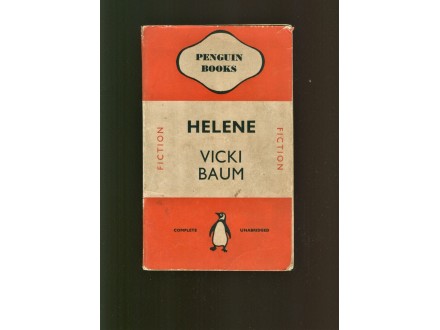Vicki Baum - Helene
| Cena: |
| Želi ovaj predmet: | 1 |
| Stanje: | Polovan bez oštećenja |
| Garancija: | Ne |
| Isporuka: | Pošta Post Express Lično preuzimanje |
| Plaćanje: | Tekući račun (pre slanja) Lično |
| Grad: |
Beograd-Zvezdara, Beograd-Zvezdara |
ISBN: Ostalo
Godina izdanja: 1900 - 1949.
Jezik: Engleski
Tematika: Književnost
Kulturno dobro: Predmet koji prodajem nije kulturno dobro ili ovlašćena institucija odbija pravo preče kupovine
Autor: Strani
Vicki Baum - Helene
Penguin, 1939
279 str.
meki povez
stanje: dobro
A bestseller in its day, Vicki Baum`s Stud. chem. Helene Willfüer draws on the idea of the `New Woman,` depicting a female student in the heavily male-dominated sciences, and her modern lifestyle in the Weimar Republic.
HELENE by VICKI BAUM `THE young girl sat in a fourthclass carriage of a local train, which was making its way with considerable speed through the night, in order to reach the main station at Frankfurt at the scheduled time. The February night seemed to consist entirely of black glass, lit occasionally by flashes from the windows of passr ing trains and then becoming opaque again, streaked with black rivulets of rain blown on small gusts of wind from the northeast. The air in this fourthclass carriage was heavy beneath the small, gloomy gasjets and the panes were fogged with the breath of sleeping humanity. The young girl, Fraulein Willfuera student of chemistry, to be exactwas not, however, asleep, but was sitting up right on the seat, with a tired and yet alert expression on her face. She had given up her corner seat to a woman who was holding a baby on her kp and was apparently expecting another child a young, wornout, working woman, who let her mouth fall open in sleep and was continually sinking forward, so that the baby was k constant danger of falling, and each time Fraulein Willfuer came to the rescue and prevented the fall. This was on her left. On her right sat an old man who smelt unpleasantly and pillowed his head on her shoulder in ordet to sleep comfortably. Opposite her was a youth dreaming some terrible dream that caused him to bare his teeth. Although none of this was particularly pleasing, and although Helene Willfuer herself had good cause, for sadness, she suddenly started to smile. Alone and awake amid these pitiful sleeping bundles of humanity, she was forced to smileat these people as well as at herself. Behind her smile there was, however, something else triumph, success, an obstacle overcome. I have done it, she thought and the rattle of the windows and the clack of the wheels over the track took up the thought aod echoed it rhythmically in her brain. As the train increased its speed on nearing its destination, the refrain was shortened, and to an everquickening accompani ment of w Done, done, done it Hdene Willfuer rose and gathered together her luggage. Lights, signals, shrieks from the engine, the mirror of the Rivet Main below, a prolonged rumble over a bridge between the first houses of a large town. Helenes neighbours wakened and exchanged a few words with one another. Did the young kdy live there ? asked the youth sitting opposite her. No, she was changing there, and going mrther, said Fraulein Willfuer. What a pity 1 He would have liked to have shown her the way, said the youth The young mother asked in a husky voice if the young Jady would hold the child for a moment.`
Baum’s novel stud. chem Helene Willfüer (1928; transl. as Helene, 1932 and 1933), written in the then popular style of “Neue Sachlichkeit” or New Objectivity, tells the story of a young chemistry student who becomes pregnant unintentionally and tries without success to obtain an abortion. Despite her struggles as a single mother she becomes a recognized chemist and invents a miracle drug for rejuvenation. Baum’s presentation of a strong, independent “New Woman” is relativized by melodramatic elements and a traditional love-story. But it was perhaps just this combination that made the book so wildly popular. Its serialization in the BIZ raised the paper’s circulation by 200,000. The novel was filmed in 1929 with Olga Tschechowa as Helene. Baum herself became a celebrity in Germany and, like today’s superstars, even appeared in ads such as the one in the BIZ where she praises her Alpina watch, which helps her “stay in control of [her] time in spite of all [her] work.” (The advertisement is reprinted in K 42.)
Fiction, Classics
Plaćanje pouzećem i postnetom za sada nisu opcija.
Lično preuzimanje je isključivo na Konjarniku uz prethodni dogovor.
Hvala na razumevanju.
Predmet: 73417657









